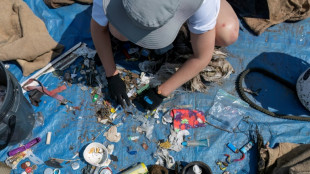
-
 Bumrah takes four as India bowl out Bangladesh for 149
Bumrah takes four as India bowl out Bangladesh for 149
-
Sri Lanka 134-1 to take upper hand in first New Zealand Test

-
 Bayern's Kompany calls for game cap for players amid strike talks
Bayern's Kompany calls for game cap for players amid strike talks
-
Christie's expands Hong Kong footprint in hope of art market 'pickup'

-
 Sultry screen legend Sophia Loren turns 90
Sultry screen legend Sophia Loren turns 90
-
Cambodian opposition figure in court on incitement charge

-
 Bumrah takes three wickets to have Bangladesh in trouble at 112-8
Bumrah takes three wickets to have Bangladesh in trouble at 112-8
-
Kimchi threat as heatwave drives up South Korea cabbage prices

-
 UK economic data delivers fresh blow to new govt
UK economic data delivers fresh blow to new govt
-
China to 'gradually resume' seafood imports from Japan after Fukushima ban

-
 India minister blames dam release for flooding
India minister blames dam release for flooding
-
O'Rourke strikes early for Kiwis as Sri Lanka trail by three

-
 Deep takes two as Bangladesh totter in reply to India's 376
Deep takes two as Bangladesh totter in reply to India's 376
-
Israel pounds Lebanon's Hezbollah after device blasts

-
 Revolution or mirage? Controversy surrounds new Alzheimer's drugs
Revolution or mirage? Controversy surrounds new Alzheimer's drugs
-
Ashwin's 113 powers India to 376 in Bangladesh Test

-
 Biden opens home to 'Quad' leaders for farewell summit
Biden opens home to 'Quad' leaders for farewell summit
-
Sally Rooney returns with 30-something questions

-
 Wallabies sense 'massive' chance to upset All Blacks
Wallabies sense 'massive' chance to upset All Blacks
-
Taiwan questions two in probe into Hezbollah pagers

-
 Viral Korean Olympic shooter scores first acting role as assassin
Viral Korean Olympic shooter scores first acting role as assassin
-
Farrell set for 'challenge' of downing Bordeaux in Top 14

-
 Springbok Etzebeth diverts attention from looming caps record
Springbok Etzebeth diverts attention from looming caps record
-
Inter on a high ahead of Milan derby as Napoli face Juve test

-
 Bank of Japan leaves key interest rate unchanged
Bank of Japan leaves key interest rate unchanged
-
Arnold quits after six years in charge of Australia

-
 Asian markets track Wall Street record to extend global rally
Asian markets track Wall Street record to extend global rally
-
Guirassy and Anton to return to Stuttgart with new side Dortmund

-
 Marseille bidding to continue 'almost perfect' Ligue 1 start
Marseille bidding to continue 'almost perfect' Ligue 1 start
-
Arnold quits as coach of Australia men's football team

-
 Harris and Oprah hold star-studded US election rally
Harris and Oprah hold star-studded US election rally
-
Allies to remember failed WWII parachute operation

-
 Perez leading new-look Villarreal charge against leaders Barca
Perez leading new-look Villarreal charge against leaders Barca
-
Man City face Arsenal in Premier League title showdown, Postecoglou under pressure

-
 Fake celebrity endorsements, snubs plague US presidential race
Fake celebrity endorsements, snubs plague US presidential race
-
Documentary brings Argentine 'death flights' to the big screen

-
 Strike shows challenge to Boeing 'reset' of labor relations
Strike shows challenge to Boeing 'reset' of labor relations
-
World leaders to gather at UN as crises grow and conflicts rage

-
 How plastic pollution poses challenge for Canada marine conservation
How plastic pollution poses challenge for Canada marine conservation
-
Scientists track plastic waste in pristine Canada marine park

-
 South Africa's Buhai grabs LPGA Queen City lead
South Africa's Buhai grabs LPGA Queen City lead
-
Japan inflation firms to 2.8% ahead of BoJ rate decision

-
 Russia's Kadyrov accuses Musk of 'remotely disabling' his Cybertruck
Russia's Kadyrov accuses Musk of 'remotely disabling' his Cybertruck
-
Titan sub had to abort a dive days before fatal implosion: testimony

-
 Ohtani makes MLB history with first 50-homer, 50-steal season
Ohtani makes MLB history with first 50-homer, 50-steal season
-
Ohtani eyes MLB history after surpassing 50 stolen bases, 49 homers

-
 Ohtani eyes MLB history after surpassing 50 stolen bases
Ohtani eyes MLB history after surpassing 50 stolen bases
-
Barca downed by Monaco as Arsenal held in Champions League stalemate

-
 Head's 'good night at office' after century seals win over England
Head's 'good night at office' after century seals win over England
-
Dubois seeks legitimacy with Joshua scalp


China to 'gradually resume' seafood imports from Japan after Fukushima ban
China said Friday that it would "gradually resume" importing seafood from Japan after imposing a blanket ban in August last year over the release of water from the disabled Fukushima nuclear plant.
"China will begin to adjust the relevant measures based on scientific evidence and gradually resume imports of Japanese aquatic products that meet the regulation requirements and standards," a foreign ministry statement said.
Chinese and Japanese officials recently conducted "multiple rounds of consultations" on the discharge of water from the stricken Fukushima Daiichi nuclear power station, the ministry said.
It said Japan had committed to "fulfilling its obligations under international law, doing its utmost to avoid leaving (a) negative impact on human health and the environment, and conducting continuous evaluations of the impact on the marine environment and marine ecosystems".
In 2011, three reactors at the Fukushima-Daiichi facility in northeastern Japan went into meltdown following a massive earthquake and tsunami that killed around 18,000 people.
Since then, plant operator TEPCO collected water contaminated as it cooled the wrecked reactors, along with groundwater and rain that has seeped in.
- Fierce backlash -
Japan in late August 2023 began discharging treated contaminated water from the Fukushima plant into the Pacific Ocean in an operation it insists is safe, a view backed by the UN atomic agency.
The release, however, generated a fierce backlash from China, which branded it "selfish" and banned all Japanese seafood imports.
China's foreign ministry said in its statement Friday that Tokyo welcomed the establishment of a "long-term international monitoring arrangement within the International Atomic Energy Agency (IAEA) framework covering key stages in the discharge of the nuclear-contaminated water".
"Both sides agree to continue to have constructive, science-based dialogue with a great sense of responsibility for the ecosystem, the environment, and human life and health," it added.
Around the same time as the announcement, Japanese Prime Minister Fumio Kishida said Tokyo had "informed the Chinese side of its readiness to carry out additional monitoring of the... treated water, while the Chinese side has decided to... steadily restore imports of Japanese fishery products that meet certain standards".
Despite the gradual resumption of seafood imports, a spokeswoman for Beijing's foreign ministry said China still "resolutely opposes" Japan's discharge of water from Fukushima.
"First of all, China resolutely opposes the Japanese side's arbitrary discharge (of contaminated water) into the sea," spokeswoman Mao Ning told a regular press conference, adding: "This position has not changed."
China imported over $500 million worth of seafood from Japan in 2022, according to customs data.
O.Bulka--BTB
